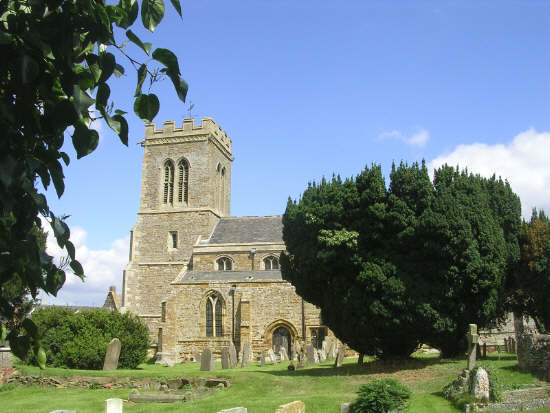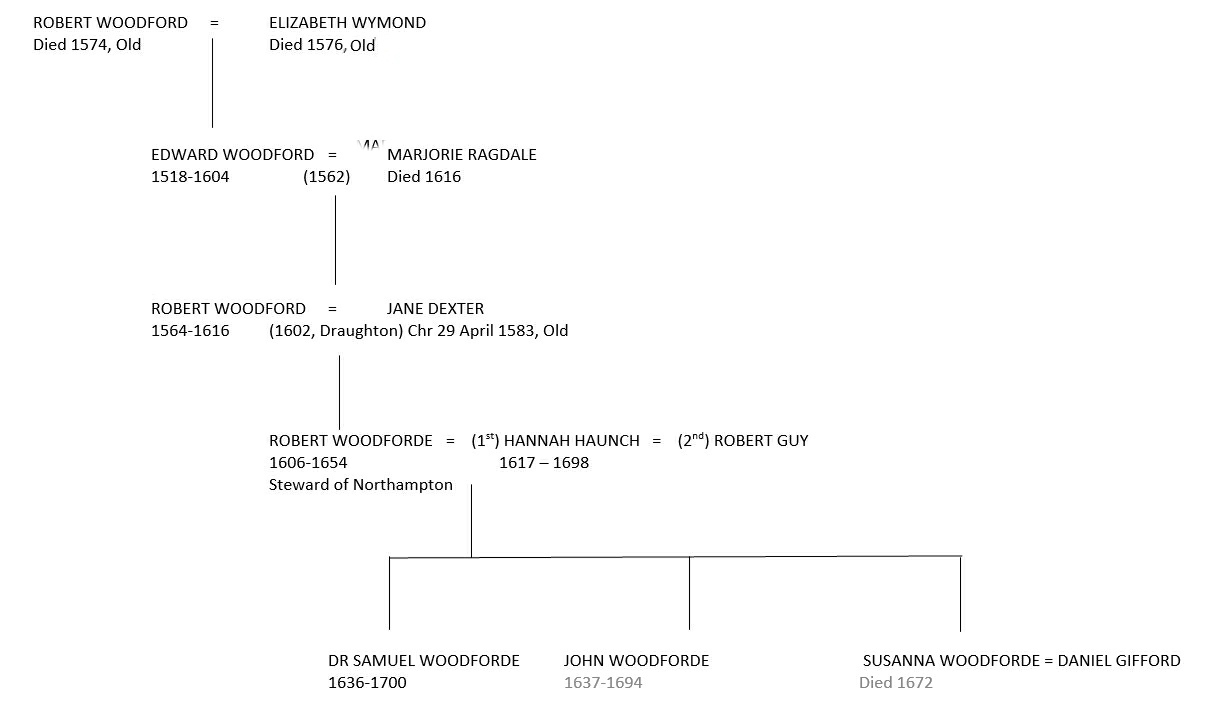Robert Woodforde of Old
Robert Woodforde (1606-1654) was born at Old (previously Wold) in Northamptonshire, and was baptised there on 6 April 1606. The baptism is recorded in the parish register in which he is described as the son of Robert and Jane Woodforde. Two entries in his diary marking the author's birthday indicate that he believed he had been born on 3 April 1606:‑
" I am this day 33 yeares old I think & my wife 22."
3 April 1639.
" This day I am 34 I thinke Lord I blesse thee for sparinge my life so long ...

The marriage of the diarist's parents, Robert Woodforde and Jane Dexter, is recorded in the register in 1603 with an entry noting that the marriage was also solemnised in the adjacent parish of Draughton.
The diarist's mother, Jane Dexter, was a daughter of the lord of one of the two manors in Old. The two manors later merged but at that time were known by the names of their lordships as Dexter's Manor and Knightley's Manor. A 'Mr Knightley' is noted in the diary on 15 September 1640 as one of the 'knights and gents of the county'. During the 16th century, members of the Knightley family were supporters of the puritan cause in Northamptonshire. The Dexter and Woodforde families held land in Old at the time of the enclosure of the parish and their descendants are still in the area.
The parish register of Old indicates that the family had lived in the village for at least four generations before Robert's birth. The earliest reference is the burial of a Robert Woodforde in 1574, the great‑grandfather of Robert Woodforde the diarist.

Robert Woodforde's marriage to Hannah Haunch, the daughter of a London `gentleman', took place At All Hallows, London Wall. He confirms the date of his marriage in a diary entry on 22 January 1637/8:
" This day I have bene marryed 3 yeares, blessed be thy name oh Lord for the m(er)cy thou hast showed me ... "
There is a similar and fuller entry on 23 January 1638/9:‑
" Martins to night to suppe I prayd with them being my wedding might this day 4 yeares the Lord ioyned me & my deare wife together in that holy ordnance of marriage."
Little is known about the diarist's childhood or his education except that for a time he attended a school in Brixworth between Market Harborough and Northampton, about five miles from Old. This is confirmed by an entry in the diary for 9 November 1638:‑
" I heare to day that Rob. Yorke an Attourney at Harborowe (sometime my schole fellowe at Brixworth) is lately dead of the smallpox."
He trained as an attorney by John Reading, a barrister at Inner Temple.
Robert Woodforde's first child, Samuel, was in 1636. The second child, John, was born in 1637. The first entry in the diary is for 20 August 1637 and records the baptism of John at All Saints, Northampton. Parish registers record the baptism of twelve children born to Robert and Hannah Woodforde of which only the eldest three are known to have survived to adulthood.
Robert
Woodforde was appointed to the post of Steward of Northampton in 1634
after agreeing to pay a pension to his predecessor. It appears that
he held the post until his death in November 1654 as it was in that same
year that his successor took office. His signature (and that
of his clerk) appears on a conveyance for Wappenham in
Northamptonshire near the county border with Oxfordshire dated
26 August 1650.
The three children who survived to adulthood were:
(1) Susanna Woodford(e) married Daniel Gifford. They had one son, Samuel. When Gifford, following problems with debts, emigrated to the East Indies, Susanna moved to live with her brother Samuel at Binsted, where he claimed she died of grief (and consumption) on 26 September 1672. After her death, Susanna's son, Samuel, was adopted by her mother (Hannah) and stepfather, Robert Guy.
(2) Samuel Woodforde (1636-1700) married firstly Alicia Beale. From this marriages is descended the branch of the family that settled in Ansford and Castle Cary in Somerset.
(3) John Woodforde (1637-1694), was born in London on 8 August 1637. He was baptised at All Saints, Northampton on 20 August 1637. He was apprenticed to his grandmother, Susanna Haunch, in London, and completed his apprenticeship in 1658. He became known as 'John of London'. By 1678 he was married with children and living in the parish of All Hallows, London Wall. (Ref: John Fielding, The Diary of Robert Woodford, 1337-1641, Camden Fifth Series, Cambridge, 2013). A line of research suggests that he married Sarah May on 21 February 1660 at St Stephen Walbrook with St Benet Sherehog, London.
Robert Woodforde's burial is recorded in the register for All
Saints, Northampton on 17 November 1654 as `under sheriff' at the age of
48 years. His clerk died ten days later and this coincidence would
suggest that both men may have died of the same infection, though some commentators record that Robert died of tubercolosis.
He left no will, administration of his estate being granted in the following year to his widow Hannah. At the time of her husband's death Hannah was aged 37 years. She later married Robert Guy, lord of Holdenby Hall. She was buried at Isham in Northamptonshire.

The Diary of Robert Woodforde

The diary of Robert Woodforde of Northampton is the earliest of the Woodforde diaries known to exist. It measures approximately seven inches in height and four inches in width and consists of 283 pages bound in calfskin. The diarist has written on both sides of each page to form 566 pages of text amounting to about 89,000 words.
The volume covers the period from 20 August 1637 to 3 August 1641. There is an entry for almost every day of this period even when the diarist is lodging away from home. There are very few omissions and when these do occur, the entry following normally includes a brief recapitulation of activity during the missing days so effectively maintaining the chronology for the complete period of four years.
The tense of the text indicates that the diarist has entered material at both the beginning and at the end of a day and therefore some entries include text written from several different perspectives of time. On occasions of particular emotion or grave anxiety, such as family illness, the Robert Woodforde composed specific prayers of petition or thanksgiving which are written separately on the last eighteen pages of the diary. A note in the relevant entry records that such a prayer has been composed and has been written at the end of the book. These prayers and petitions are much longer and more emotional in content than the chronological material.
It appears that the diarist has occasionally re‑read previous entries and has added postscripts which appear in handwriting of a different thickness and size. Most of these additions and amendments have been added after the writer has returned home following a long journey or an extended period of absence. These are not to be confused with some annotations and underlinings in blue pencil which are in the later hand of one of his descendants, Dr Robert Edmund Heighes Woodforde.
The diary immediately reveals that Robert was a literate and well‑educated man. His duties as Steward required him to be so and in his diary he frequently employs Latin words and terms drawn from legal phraseology. As a man of strong puritan leanings he had a profound knowledge of the Bible and was able to quote biblical passages with their references at will, though almost always from the Old Testament.
The diary leaves the reader with the impression that the author was a serious and intense individual who regarded Puritanism as a way of life as well as a strand of religious, moral and spiritual thought. He appears to have judged himself more harshly than he judged others and seems frequently to have been overwhelmed by the "thorny cares of the world". He drew support and comfort from his church, principally the inspiring sermons of Revd Thomas Ball, the friendship of the church community, and his own strong family ties.
Although a critical man, Robert
appears as a very fair and conscientious judge of others. He
rarely expresses his condemnation of another man, more often
seeking God's hand in changing the heart and mind of someone who has
wronged him.
